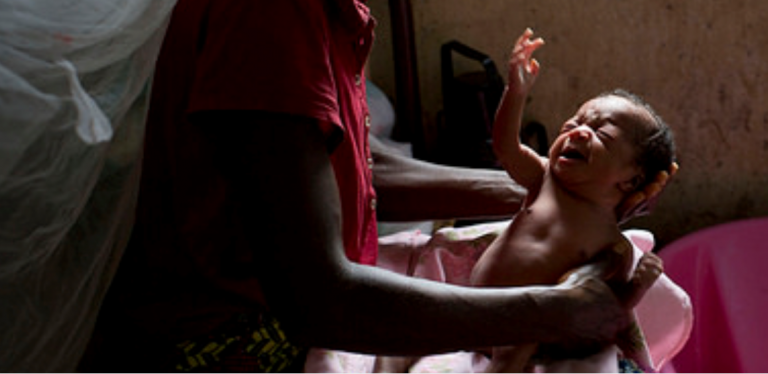The Maternal Child and Survival Program in the Democratic Republic of the Congo (DRC) works tirelessly to reduce deaths among moms and babies. To learn more, we interviewed Dr. Jimmy Anzolo Mongonda, Provincial Program Team Lead of USAID’s flagship Maternal & Child Survival Program, DRC, at the United Nations Foundation.
Dr. Jimmy Anzolo Mongonda’s team works to empower Congolese health professional organizations through high-quality, training and education on key mother and newborn health and postpartum family planning interventions.
https://www.facebook.com/GlobalMomsChallenge/videos/1792799277445690/
How did you get involved with working in child health? Why does this work matter to you?
Caring for children has always been my passion since the beginning of my career as a clinician and as a program manager.
In my year career, I cared for children suffering from malaria, pneumonia, diarrhea, HIV & AIDS, tuberculosis and even sickle cell disease. And I started in MCSP as Child Health Technical Advisor, supporting the implementation efforts of CSS in rural health areas in the DRC.
The mortality of children under 5 years and newborns is still high in the DRC, we must get involved and act to save lives!
I think mothers can explain better than me why we have to keep the child healthy.
Can you tell the viewers who are watching now about some of the biggest challenges that you face in keeping children alive in your country?
- Low Accessibility, Here are the factors that explain this situation:
- Geographic barriers: especially in rural areas, many households do not have easy access to care facilities, either by distance or because of geographical barriers (river, river, setting up, swamp, forest …);
- Financial accessibility to quality care for many rural households
-
- Some beliefs and customs: Especially in rural areas, some beliefs suggest mothers to go to traditional healers before going to the health center or hospital.
- Insufficient equipment of heath facilities for the care of newborns and children, especially in rural areas, despite efforts made in recent years by the DRC government and its partners;
- Insufficient funds for health in general, despite considerable efforts made by the Ministry of Health in recent years, the country needs external funds to cover needs in the field of health, particularly in the field of the Child and the Mother Survival.
In short, a lot of considerable effort has been made over the last decade by the Government of the DRC and its partners, but there are gaps to be filled to save more children’s lives in the DRC.
Please tell us more about the work you lead at the Maternal & Child Survival Program. How is your team ensuring that we reach more children with lifesaving medicines?
- To reduce the number of deaths of moms and babies by strengthening national Ministry of Health’s capacity to scale up cost-effective and proven interventions.
- To contribute to improved mom and baby survival by empowering Congolese health professional organizations at the national level to provide quality training and education to health workers in the field.
- To contribute to improved child survival and increase awareness and use of planning methods in under-served rural communities in Tshopo and Bas-Uele provinces.

What story sticks with you the most about a health worker reaching a child with a lifesaving intervention?
A pregnant woman has been divorced in her village by her husband because of leprosy, she gave birth to twins in a village on an island far from a health center. As her fingers and toes were all mutated by leprosy, she had no money to care for her children every time they were sick. It is still in a SSC that these twins who are now 3 years old, have been treated for malaria, pneumonia, diarrhea. Through a community health worker trained by MCSP support. This woman gave her testimony by saying that it is thanks to the community health worker and the support of the MCSP that these twins are still alive, in good health and they are now three years old.

This blog is cross-posted from the Global Moms Challenge website.

